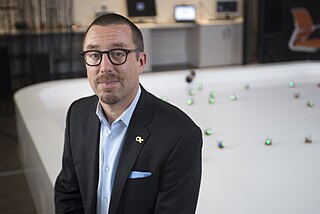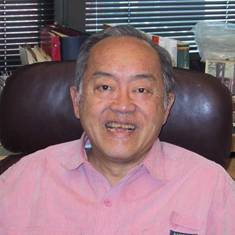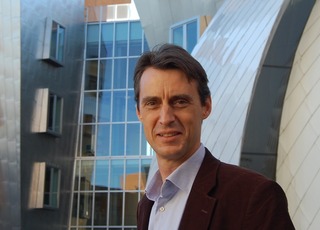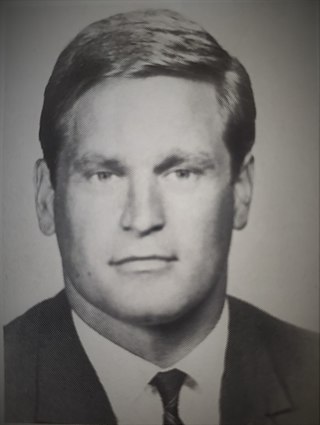Related Research Articles

Eduardo Daniel Sontag is an Argentine-American mathematician, and distinguished university professor at Northeastern University, who works in the fields control theory, dynamical systems, systems molecular biology, cancer and immunology, theoretical computer science, neural networks, and computational biology.
Giovanni De Micheli is a research scientist in electronics and computer science. He is credited for the invention of the Network on a Chip design automation paradigm and for the creation of algorithms and design tools for Electronic Design Automation (EDA). He is Professor and Director of the Integrated Systems laboratory at École Polytechnique Fédérale de Lausanne (EPFL), Switzerland. Previously, he was Professor of Electrical Engineering at Stanford University. He was Director of the Electrical Engineering Institute at EPFL from 2008 to 2019 and program leader of the Swiss Federal Nano-Tera.ch program. He holds a Nuclear Engineer degree, a M.S. and a Ph.D. degree in Electrical Engineering and Computer Science under Alberto Sangiovanni-Vincentelli.
John Comstock Doyle is the Jean-Lou Chameau Professor of Control and Dynamical Systems, Electrical Engineering, and BioEngineering at the California Institute of Technology. He is known for his work in control theory and his current research interests are in theoretical foundations for complex networks in engineering, biology, and multiscale physics.

Magnus B. Egerstedt is a Swedish-American roboticist who is the Dean of the Henry Samueli School of Engineering at the University of California, Irvine. He was formerly the Steve C. Chaddick School Chair and Professor at the School of Electrical and Computer Engineering, Georgia Institute of Technology.

Yu-Chi "Larry" Ho is a Chinese-American mathematician, control theorist, and a professor at the School of Engineering and Applied Sciences, Harvard University.
Kumpati S. Narendra is an American control theorist, who currently holds the Harold W. Cheel Professorship of Electrical Engineering at Yale University. He received the Richard E. Bellman Control Heritage Award in 2003. He is noted "for pioneering contributions to stability theory, adaptive and learning systems theory." He is also well recognized for his research work towards learning including Neural Networks and Learning Automata.
Michael Athans was a Greek-American control theorist and a Professor Emeritus in the Department of Electrical Engineering and Computer Science at the Massachusetts Institute of Technology. He was a Fellow of the IEEE (1973) and a Fellow of the AAAS (1977). He was the recipient of numerous awards for his contributions in the field of control theory. A pioneer in the field of control theory, he helped shape modern control theory and spearheaded the field of multivariable control system design and the field of robust control. Athans was a member of the technical staff at Lincoln Laboratory from 1961 to 1964, and a Department of Electrical Engineering and Computer Science faculty member from 1964 to 1998. Upon retirement, Athans moved to Lisbon, Portugal, where he was an Invited Research Professor in the Institute for Systems and Robotics, Instituto Superior Técnico where he received a honoris causa doctorate from the Universidade Técnica de Lisboa in 2011.
Parviz Jabehdar Maralani is an Iranian electrical engineering emeritus professor and fellow of the Academy of Sciences of Iran. He has contributed significantly to the education of electrical engineering in Iran and trained many students.

Dimitri Panteli Bertsekas is an applied mathematician, electrical engineer, and computer scientist, a McAfee Professor at the Department of Electrical Engineering and Computer Science in School of Engineering at the Massachusetts Institute of Technology (MIT), Cambridge, Massachusetts, and also a Fulton Professor of Computational Decision Making at Arizona State University, Tempe.

Vincent Daniel Blondel is a Belgian professor of applied mathematics and former rector of the University of Louvain (UCLouvain) and a visiting professor at the Massachusetts Institute of Technology (MIT). Blondel's research lies in the area of mathematical control theory and theoretical computer science. He is mostly known for his contributions in computational complexity in control, multi-agent coordination and complex networks.

Dragoslav D. Šiljak is professor emeritus of Electrical Engineering at Santa Clara University, where he held the title of Benjamin and Mae Swig University Professor. He is best known for developing the mathematical theory and methods for control of complex dynamic systems characterized by large-scale, information structure constraints and uncertainty.

Wassim Michael Haddad is a Lebanese-Greek-American applied mathematician, scientist, and engineer, with research specialization in the areas of dynamical systems and control. His research has led to fundamental breakthroughs in applied mathematics, thermodynamics, stability theory, robust control, dynamical system theory, and neuroscience. Professor Haddad is a member of the faculty of the School of Aerospace Engineering at Georgia Institute of Technology, where he holds the rank of Professor and Chair of the Flight Mechanics and Control Discipline. Dr. Haddad is a member of the Academy of Nonlinear SciencesArchived 2016-03-04 at the Wayback Machine for recognition of paramount contributions to the fields of nonlinear stability theory, nonlinear dynamical systems, and nonlinear control and an IEEE Fellow for contributions to robust, nonlinear, and hybrid control systems.
Debasish Ghose is a professor at Department of Aerospace Engineering, Indian Institute of Science. He is believed to have initiated work on cooperative control in India, having pioneered research on Intelligent control and multi-agents. He founded the first mobile robotics lab in India i.e. Mobile Robotics Laboratory at IISc in 2002. He is known for his early work in swarm intelligence, distributed computing and game theory. His primary research is in Guidance and control of autonomous vehicles, although, current interest is in Computational intelligence i.e. Machine Learning for Aerial Robotics.

Bruce Edward Hajek is a Professor in the Coordinated Science Laboratory, the head of the Department of Electrical and Computer Engineering, and the Leonard C. and Mary Lou Hoeft Chair in Engineering at the University of Illinois Urbana–Champaign. He does research in communication networking, auction theory, stochastic analysis, combinatorial optimization, machine learning, information theory, and bioinformatics.

Daniele Mortari is Professor of Aerospace Engineering at Texas A&M University and Chief Scientist for Space for Texas A&M ASTRO Center. Mortari is known for inventing the Flower Constellations and the k-vector range searching technique and the Theory of Functional Connections.

Ishfaq Ahmad is a computer scientist, IEEE Fellow and Professor of Computer Science and Engineering at the University of Texas at Arlington (UTA). He is the Director of the Center For Advanced Computing Systems (CACS) and has previously directed IRIS at UTA. He is widely recognized for his contributions to scheduling techniques in parallel and distributed computing systems, and video coding.

Moeness G. Amin is an Egyptian-American professor and engineer. Amin is the director of the Center for Advanced Communications and a professor in the Department of Electrical and Computer Engineering at Villanova University.

Silvia Ferrari is an Italian-American aerospace engineer. She is John Brancaccio Professor at the Sibley School of Mechanical and Aerospace Engineering at Cornell University and also the director of the Laboratory for Intelligent Systems and Control (LISC) at the same university.
Sonia Martínez Díaz is a Spanish mechanical engineer whose research applies control theory to the coordinated motion of robot swarms and mobile wireless sensor networks. She is a professor in the Department of Mechanical and Aerospace Engineering at the University of California, San Diego.

Khanh Dai Pham is a Vietnamese-born American aerospace engineer. He is noted for his work in statistical optimal control theory, game-theoretic operations research of military satellite communications, space control autonomy, and space domain awareness and the government leadership in innovation ecosystem and coalition of government agencies, small business and industry. He is a Fellow of the Air Force Research Laboratory (AFRL), the National Academy of Inventors (NAI), the Institution of Engineering and Technology (IET), the Society of Photo-Optical Instrumentation Engineers (SPIE), the Royal Aeronautical Society (RAeS), the International Association for the Advancement of Space Safety (IAASS), and the Royal Astronomical Society (RAS). He is not only a Fellow of the Institute of Electrical and Electronics Engineers (IEEE), the American Astronautical Society (AAS), and the Asia-Pacific Artificial Intelligence Association (AAIA) but also an Associate Fellow of the American Institute of Aeronautics and Astronautics (AIAA) and the Royal Institute of Navigation (RIN).
References
- 1 2 3 4 5 6 "2009 Distinguished Teaching Awards Bios - Panelist Mehran Mesbahi". www.washington.edu: University of Washington Alumni Association. 2009. Archived from the original on October 9, 2012. Retrieved April 2, 2011.
- ↑ "1999-2000 Faculty & Staff". www.aem.umn.edu: University of Minnesota, College of Science & Engineering, Department of Aerospace Engineering and Mechanics. 2009. Retrieved April 2, 2011.
- ↑ "Distinguished Teaching Award". Columns. University of Washington Alumni. July 2005. Retrieved April 2, 2011.